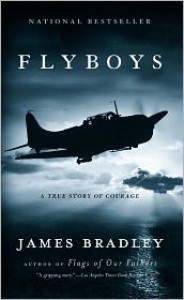Currently reading
Inherent Vice
The Best Horror of the Year Volume Five
Locus Solus (Alma Classics)
Blackout (Newsflesh Trilogy, #3)
Flyboys: A True Story of Courage
 This is a searing look at the War in the Pacific. James Bradley (author of Flags of our Fathers) writes as an American who clearly has a great deal of love and pride for his country, but is too intellectually honest to look away from our hypocritical record. This is not a book that presents World War II as a "good war" in which America was good and the Germans and the Japanese were evil. Neither does it make a false equivalency with some of the terrible things America has done and thus imply that we were no better than the Germans and the Japanese. We did terrible things, and Bradley talks about them - from our genocide of Native Americans to our slaughter of Filipino resistance fighters to our outright ignoring all the rules of war we condemned the Japanese for breaking. But we didn't perpetrate a Holocaust, we didn't do what the Japanese did in China, and we didn't torture, execute, and eat POWs. Reading Flyboys was gut-churning all the way through, from the global perspective, when Bradley looks at the horrors of the war from all sides, to the individual perspective, when he focuses on the seven men who are ostensibly the subjects of his book.
This is a searing look at the War in the Pacific. James Bradley (author of Flags of our Fathers) writes as an American who clearly has a great deal of love and pride for his country, but is too intellectually honest to look away from our hypocritical record. This is not a book that presents World War II as a "good war" in which America was good and the Germans and the Japanese were evil. Neither does it make a false equivalency with some of the terrible things America has done and thus imply that we were no better than the Germans and the Japanese. We did terrible things, and Bradley talks about them - from our genocide of Native Americans to our slaughter of Filipino resistance fighters to our outright ignoring all the rules of war we condemned the Japanese for breaking. But we didn't perpetrate a Holocaust, we didn't do what the Japanese did in China, and we didn't torture, execute, and eat POWs. Reading Flyboys was gut-churning all the way through, from the global perspective, when Bradley looks at the horrors of the war from all sides, to the individual perspective, when he focuses on the seven men who are ostensibly the subjects of his book.The unifying thread in this book is eight "Flyboys" who were shot down over the small island of Chichi Jima during the final months of the war. Seven of them were taken prisoner by the Japanese. None of them survived. The Army put the Japanese officers responsible for their deaths on trial, and executed several of them, but the details remained classified for decades because the US thought it would be too inflammatory and too distressing to the men's families. (In fact, as Bradley describes, the heartbreak of not knowing and not even having a body to bury broke several of their families, sending their parents into lifelong depression, alcoholism, and/or early deaths.) Bradley was contacted by someone who wanted these men's stories told, and he acquired the records of the trial, the men's service records, and interviewed every survivor he could find, on both sides - friends and family of the dead men, still-living Japanese soldiers who knew the prisoners (and one who was one of their executioners), and even former President George H. Bush - who was the one pilot shot down over Chichi Jima who was recovered by the US Navy before the Japanese could take him prisoner.
The story of these individual pilots and gunners is sad and gruesome, but Bradley puts it in a wider context; Americans and Japanese did terrible things to each other all over the Pacific. If he just talked about the individual fates of seven American airmen, it would be easy to arouse moral hatred of the Japanese officers who ordered their deaths (and many of the Japanese officers were monstrous). But he also talks about how Japanese soldiers were indoctrinated, how they were treated by their superiors, what they endured as they were relentlessly bombed, and what was happening in Japan, as American B-29s set most of Japan's cities ablaze and turned over a third of the population homeless.
People can argue about the morality of napalming civilians vs. the morality of torturing POWs to death, but if there's one take-away from this book, it is that war is an atrocity, period.
Besides the hard look at the horrors of war, Flyboys is also a high-level look at the history of the war in the Pacific, starting with Japan's rise as an imperial power, and at the history of air warfare and how the U.S. became the preeminent military superpower in the world by gambling everything on air power, which was still mostly untested when we entered WWII. All the major historical turning points - Pearl Harbor, Midway, Doolittle's raids, Iwo Jima, the preparation for an invasion of Japan, and finally, Hiroshima and Nagasaki - are covered, but mostly just in terms of how air power figured into each.
This isn't your typical history of the war. It's framed as a personal story, and spends more time talking about moral quagmires than military specifics. But it's very good and very affecting. It's not meant to give you a warm fuzzy feeling about how we won the war, but it will certainly make you admire the men who fought it, and pity them for the things they had to do.




